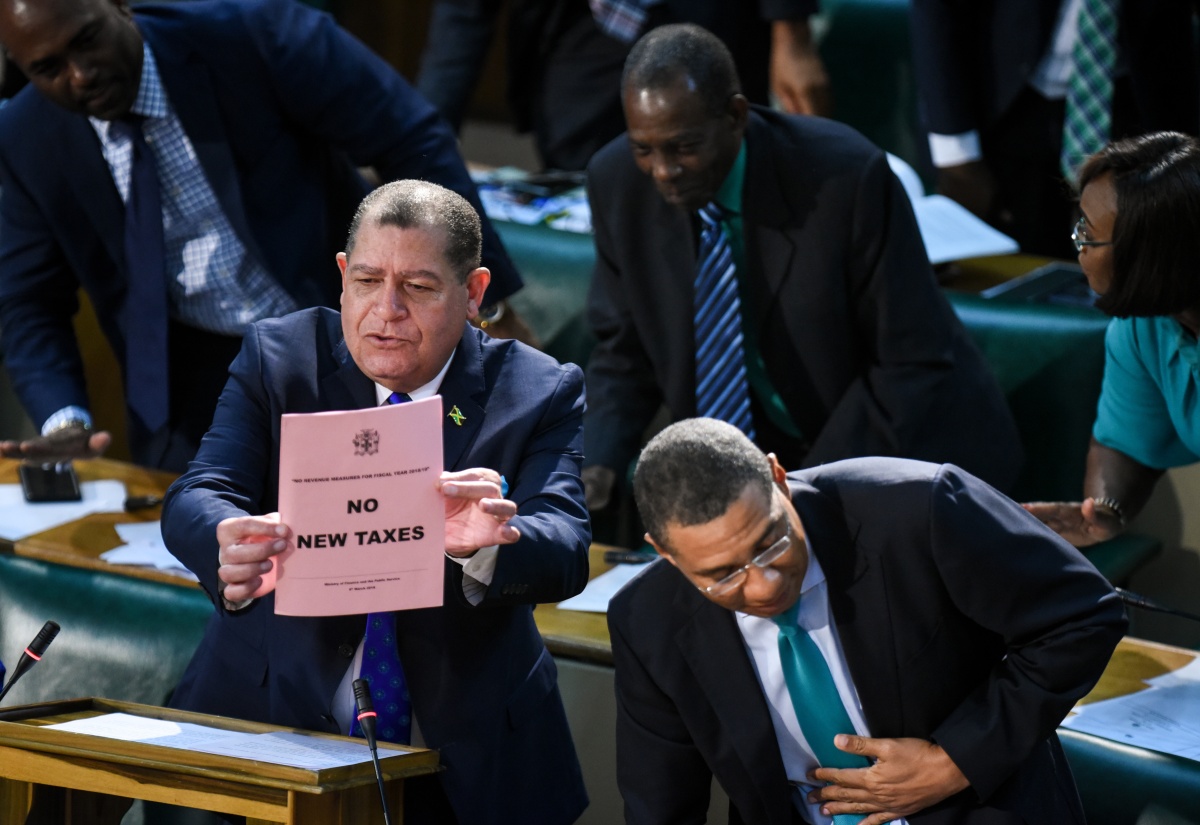No New Taxes to Fund Budget
By: , March 8, 2018The Key Point:
The Facts
- “We have seen that, along with increased compliance measures, there has been tax revenue buoyancy… (and) along with our continued fiscal discipline, we have also been able to contain expenditures,” Mr. Shaw said.
- In his speech, themed ‘Stability, Growth and Prosperity – Our Goal, Our Responsibility’, Mr. Shaw said tax revenue this year is budgeted at $518.4 billion, representing 25.7 per cent of GDP.
The Full Story
Finance and the Public Service Minister, Hon. Audley Shaw, on Thursday (March 8) formally announced that the Government will not be introducing new taxes to fund the 2018/19 Budget, amounting to approximately $773.6 billion.
Instead, he said the Administration intends to do so from revenue and grants, which are “passively” forecast at $590.6 billion or 29.3 per cent of gross domestic product (GDP), among other sources.
“We have seen that, along with increased compliance measures, there has been tax revenue buoyancy… (and) along with our continued fiscal discipline, we have also been able to contain expenditures,” Mr. Shaw said.
The Minister was opening the 2018/19 Budget Debate in the House of Representatives.
In his speech, themed ‘Stability, Growth and Prosperity – Our Goal, Our Responsibility’, Mr. Shaw said tax revenue this year is budgeted at $518.4 billion, representing 25.7 per cent of GDP.
This sum, he indicated, is expected to account for 87.8 per cent of total revenue and grants, compared to the 88.8 per cent projected out-turn for 2017/18.
Non-tax revenue is forecast to be $60.9 billion or three per cent of GDP, representing a 14 per cent increase over the revised 2017/18 Estimates, which amounted to 2.8 per cent.
The projected out-turns in this category include receipts of $5.4 billion from Customs administration fees; transfers of $12.7 billion from the de-earmarked entities – the CHASE Fund, Tourism Enhancement Fund, and Jamaica Civil Aviation Authority; and a special distribution of US$101 million from the PetroCaribe Development Fund.
Mr. Shaw said capital revenue is programmed at $2.1 billion, with grants projected to total $9.1 billion or 0.4 per cent of GDP.
“This (grants projection) reflects an increase of 101 per cent. The amount includes European Union grant inflows totalling $3.6 billion, of which $1.4 billion is budgeted to support the Justice Sector Reform Programme, while $2.3 billion represents the second tranche (of) budget support receipts under the Accompanying Measures for Sugar Protocol Countries 2013 Financing Agreement,” the Minister stated.
Mr. Shaw advised that Central Government’s borrowing requirements for 2018/19 amounts to $103.2 billion.
He said that of the budgeted receipts, $78.1 billion is programmed to be raised domestically and $25.1 billion externally.
“This borrowing requirement represents a 48.4 per cent reduction in total loan receipts when compared with fiscal year 2017/18. The lower borrowing (year-on-year) requirement reflects the significantly lower amortisation costs for fiscal year 2018/19 and the planned utilisation of existing cash resources,” the Minister added.
Mr. Shaw also reiterated the Government’s undertaking to continue the tax reform programme.
The Minister conveyed the Administration’s gratitude to Jamaica’s multilateral development partners for their ongoing support of the country’s economic programme.
These include the European Union, Global Fund, Inter-American Development Bank, United States Agency for International Development, Caribbean Development Bank, and the World Bank.


